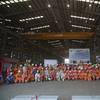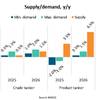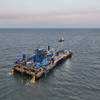Baker Hughes Inc. has completed its review of the accounting issues previously identified at its INTEQ division and will restate prior period results by $31 million on a cumulative after-tax basis ($33.1 million pre-tax) to address these issues.
Completion of the review revealed that these misstatements occurred over a number of years, with approximately $24 million (after-tax) of the adjustments relating to periods prior to 1995. All adjustments have been made to income from continuing operations. Although the amounts were attributable to several INTEQ locations, $24.2 million of the after-tax amount was related to INTEQ's Venezuelan operations.
"I am glad to be able to tell you that we have looked at these issues closely and have quantified them with certainty,'' said Joe B. Foster, interim chairman, president and CEO of Baker Hughes.
"While the adjustments did not involve the loss of cash to the company, it is a serious matter that these misstatements and lapses in control occurred. We are now confident that we have the systems and controls in place to avoid similar accounting surprises in the future. This permits us to more intensely focus on issues and actions that will lead to improved growth and profitability for Baker Hughes.''
Baker Hughes' net income for the twelve months ended December 31, 1999 was $0.10 per share, as compared to a net loss of $.92 per share for the twelve months ended December 31, 1998.
The net loss for the three months ended December 31, 1999 was $.28 per share, as compared to net income of $0.02 per share for the three months ended December 31, 1998.
All current and prior period results have been restated for the effect of the INTEQ accounting issues and to treat Baker Process as a discontinued operation.
Operating results, excluding the impact of non-recurring items, were $.22 per share for the twelve months ended December 31, 1999, as compared to $1.03 per share in the twelve months ended December 31, 1998. Operating results, excluding the impact of non-recurring items, for the three months ended December 31, 1999 were $.03 per share, as compared to $.14 per share for the three months ended December 31, 1998. Revenues for the twelve months ended December 31, 1999, were $4.547 billion, down 22 percent from the twelve months ended December 31, 1998. For the three months ended December 31, 1999, revenues were $1.104 billion, down 16 percent from the three months ended December 31, 1998.
"My challenge to the Baker Hughes organization for 2000 is to double the 1999 operational earnings," Foster said. "This is consistent with my vow to define an achievable goal that will still stretch us. Our ability to meet this goal - or exceed it - is, of course, subject to a lot of factors beyond our control. Capital spending by our customers needs to increase during the year, and there needs to be a recovery in drilling activity in the eastern hemisphere. During the first quarter of 2000, we expect to be almost breakeven, so it is clear we are counting on an improved business outlook - as well as improved performance on the cost and productivity side - during the remainder of the year to meet our objectives."
Sponsored Content
Charting a Smarter Course: How Nautical Systems by ABS Wavesight is Powering the Future of Fleet Management

Protect Your Crew. Exceed Weld Standards.

August 2025
 Read the Magazine
Read the Magazine

 Read the Magazine
Read the Magazine
This issue sponsored by:

Washington Watch – Water Carrier Statutes & Regulations
Subscribe for
Maritime Reporter E-News
Maritime Reporter E-News is the maritime industry's largest circulation and most authoritative ENews Service, delivered to your Email five times per week









